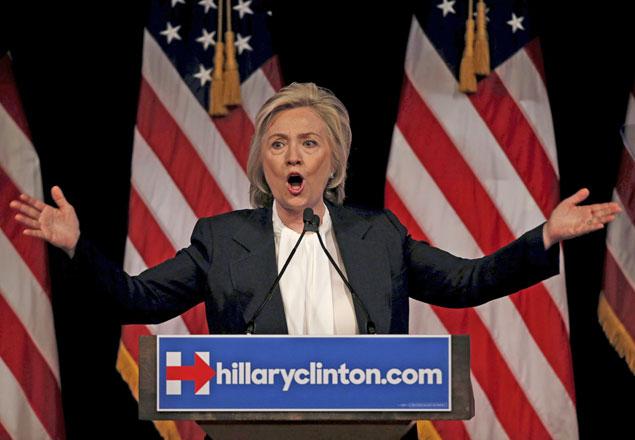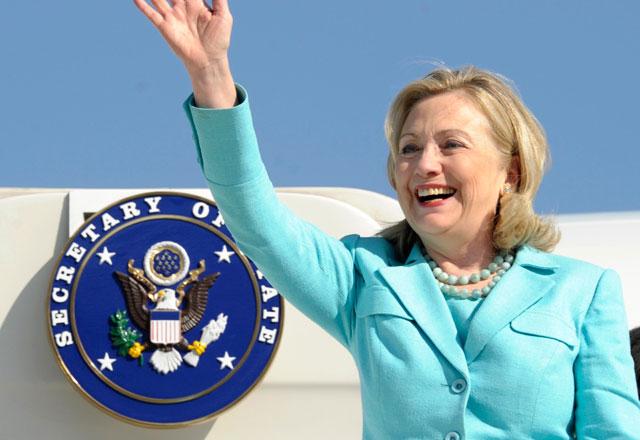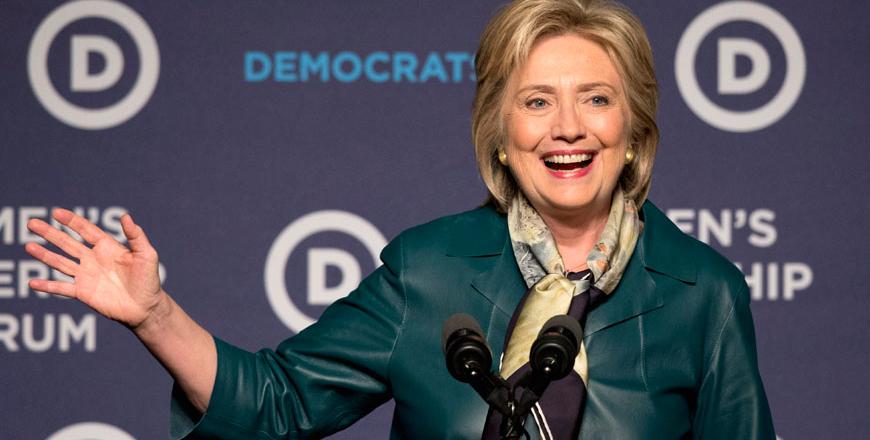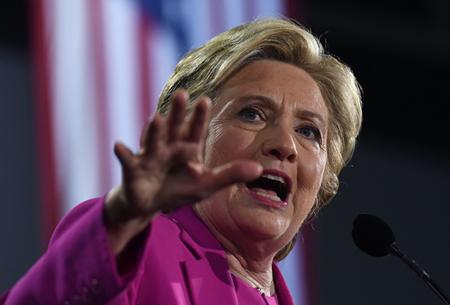You are here
Clinton pledges US income equality, bashes Wall Street
By Agencies - Jul 14,2015 - Last updated at Jul 14,2015

Democratic presidential candidate Hillary Clinton speaks at the New School in the Manhattan borough of New York City on Monday (Reuters photo)
NEW YORK — Democratic front-runner Hillary Clinton put the fight for higher wages for everyday Americans at the heart of her economic agenda on Monday and talked tough against Wall Street in the first major policy speech of her White House bid.
Clinton said the US economy will only run at full steam when middle-class wages rise steadily along with executive salaries and company profits.
"I believe we have to build a growth-and-fairness economy. You can't have one without the other," she said at The New School university in Manhattan's Greenwich Village, a bastion of liberal education.
Clinton's choice of location, a liberal arts college with annual fees of around $60,000, embodied the financial hurdle that middle-class parents face in educating their offspring. But she barely mentioned college debt.
With one eye on the growing support for Vermont Senator Bernie Sanders, a self-described socialist who is also seeking the Democratic Party nomination, Clinton laid out a vision of economic equality.
"Corporate profits are at near-record highs and Americans are working as hard as ever but paycheqes have barely budged in real terms. Families today are stretched in so many directions and so are their budgets," Clinton said.
"Families deserve to get ahead and stay ahead. The defining economic challenge of our time is clear, we must raise incomes for hardworking Americans," Clinton told a hand-picked audience. "I want to see our economy working for the struggling, the striving and the successful."
She promised to increase incomes on three tracks: strong growth, fair growth and long-term growth in a sweeping vision of promises that drilled down little into substance on how they could actually be achieved.
The former secretary of state promised to push for a broader reform of the US corporate tax code.
She criticised Republicans for 35 years of "trickle down" economics, tax cuts for the richest and big corporations writing their own rules, which she said "does practically nothing to help hardworking Americans."
She repeated calls for tax relief for small businesses, investments that would create jobs, improve infrastructure, bolster renewable energy and make it easier for women to join the workforce.
America has dropped from seventh to 19th out of the 24 most advanced nations in terms of women's labour participation rate, Clinton indicated.
Clinton, a former first lady, US senator and secretary of state, is the favourite to win the Democratic nomination for the November 2016 presidential election but Sanders has drawn large crowds at campaign events.
She talked tough against Wall Street, promising to go beyond the 2010 Dodd-Frank law that imposed stronger regulations on the financial industry.
"Too many of our major financial institutions are still too complex and too risky and the problems are not limited to the big banks that get all the headlines," she said.
Clinton warned that "serious risks are emerging from institutions in the so-called shadow banking system including hedge funds, high-frequency traders, non-bank finance companies" and other entities "which receive little oversight at all".
She will unveil more specifics of her economic policy in a series of speeches in coming weeks as Democrats seek more details of her plans on increasing the minimum wage, creating universal preschool and investing in infrastructure.
It has become too difficult for Americans to be good workers and good parents at the same time, she said, calling for paid leave, quality affordable childcare and equal pay for women.
Comprehensive immigration reform, she added, would increase gross domestic product (GDP) by $700 billion over the next decade.
"Inequality is a drag on our entire economy so this is the problem we need to tackle," she continued.
She ridiculed Republican contender Jeb Bush saying the solution to the economy was Americans working longer hours, saying nurses, teachers and truckers "don't need a lecture. They need a raise," to big cheers.
She singled out another Republican contender, Marco Rubio, for "bad economics" and proposed tax cuts for households making $3 million a year as a "budget-busting giveaway to the super wealthy".
She vowed to build on Obama's Affordable Care Act by lowering out-of-pocket healthcare costs and making prescription drugs more affordable.
Acknowledging that many of her proposals "are more than a little battle scarred", she advanced profit sharing as a new idea.
"Hardworking Americans deserve to benefit from the record corporate earnings they helped to produce," she said.
She listed long-term growth as the third key driver of income, criticising what she called "quarterly capitalism" when companies focus on the next earnings report at the expense of long-term growth.
She promised to "rein in excessive risk on Wall Street" and in reference to well-known banking scandals insisted "there can be no justification or tolerance for... criminal behavior".
In another swipe at the Republicans, she called for policies based on evidence, not ideology.
"We have to break out of the poisonous partisan gridlock and focus on the long-term needs of our country."
At the end of her speech, a member of the audience who heckled Clinton about banking legislation was swiftly escorted out by security and his cries drowned out by a standing ovation.
Related Articles
Hillary Rodham Clinton has jumped back into presidential politics, making a much-awaited announcement she will again seek the White House in 2016 with a promise to serve as the "champion" of everyday Americans in a country with growing income inequality.
ALEXANDRIA, United States — It's been a great week for Hillary Clinton.First, Democratic rival Joe Biden abandoned his presidential dreams.
WASHINGTON — Hillary Clinton has one of the strongest resumes of anyone ever to run for US president, with stints as first lady, senat



















